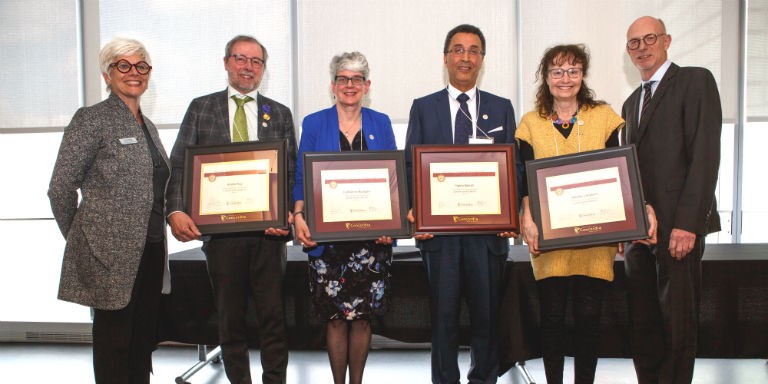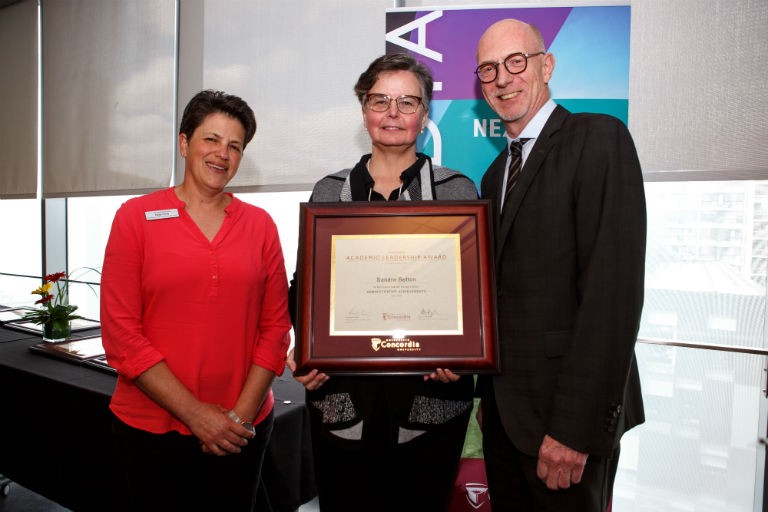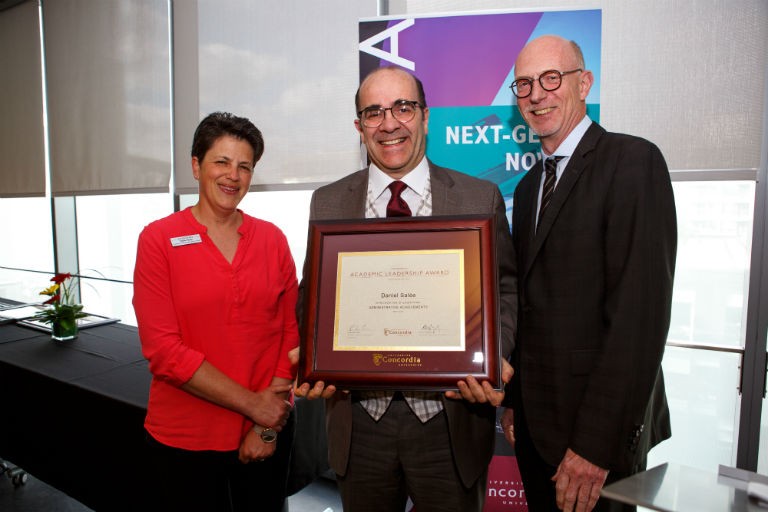9 Concordia faculty are honoured for their academic leadership, career achievements and mentorship
 Graham Carr: “It’s an honour to celebrate these individuals for their tireless commitment to students, innovative research and outstanding leadership and services.”
Graham Carr: “It’s an honour to celebrate these individuals for their tireless commitment to students, innovative research and outstanding leadership and services.”
Academic leadership comes in many forms — from graduate mentorship to cutting-edge scholarship to administrative ingenuity. All this and more was recognized at the 2019 Provost’s Celebration.
“Our faculty and librarians are a driving force behind Concordia’s success as a next-generation university,” says Graham Carr, provost and vice-president, Academic.
“It’s an honour to celebrate these individuals for their tireless commitment to students, innovative research and outstanding leadership and services.”
A ceremony was held at the John Molson (MB) Building on May 29 to honour five new members of the Provost’s Circle of Distinction, three winners of the Academic Leadership Award and one winner of the Award for Graduate Mentoring.
This year, the event was also combined with the President’s Awards for Excellence in Teaching.
Provost’s Circle of Distinction
Faculty members and librarians are invited to join the Provost’s Circle of Distinction when they receive external awards for career achievements or fellowships from external bodies.
Martha Langford is an art history professor and the director and research chair of the Gail and Stephen A. Jarislowsky Institute for Studies in Canadian Art. Langford’s research on photography and video addresses mediated experience in relation to constructs of memory and imagination, as well as vernacular photography.
During her career, Langford has held fellowships at the Institute for the Humanities at Simon Fraser University and the National Gallery of Canada. Most recently, she was inducted as a fellow into the Royal Society of Canada and will join their Academy of the Arts and Humanities.
Jean-Philippe Warren is a professor of sociology and anthropology. He investigates the history of Quebec’s people, places and culture in order to identify ways in which the province has changed over the last 100 years.
Adding to his long list of achievements, including a 2015 Governor General's Award for French-language non-fiction, Warren was inducted into the Royal Society of Canada’s Academy of Social Sciences.
André Roy is the dean of the Faculty of Arts and Science and professor in the Department of Geography, Planning and Environment. He was named a distinguished member of the Ordre de l’excellence en éducation — a recognition by the province of Quebec of academic leaders who make significant contributions to the development of education.
Roy received the distinction for his innovative and interdisciplinary approach to teaching and research on issues related to environmental degradation and sustainability. In particular, his work focuses on river systems and how urban rivers respond to climate change.
Catherine Mulligan is a professor of building, civil and environmental engineering and the director of the Concordia Institute of Water, Energy and Sustainable Systems. The institute trains students in sustainable development practices and promotes research into new systems, technologies and solutions for water, energy and resource conservation.
Mulligan was awarded the Engineering Institute of Canada’s John B. Stirling Medal, which recognizes leadership and distinguished national service within the institute and its member societies.
Electrical and computer engineering professor Habib Benali is the scientific director of the PERFORM Centre. He researches the use of multimodal imaging and computational modeling to better understand the factors that contribute to a healthy lifestyle.
Benali was named a fellow of the Institute of Electrical and Electronics Engineers (IEEE). The distinction is reserved for members whose extraordinary accomplishments in any of the IEEE’s fields of interest are deemed fitting of this prestigious appointment.
 Nadia Hardy, Sandra Betton and Graham Carr.
Nadia Hardy, Sandra Betton and Graham Carr.
Academic Leadership Awards
These awards recognize exceptional leadership abilities shown through significant administrative accomplishments at Concordia.
Recipient Sandra Betton is associate dean of professional graduate programs for the John Molson School of Business (JMSB) — just the latest of many administrative roles she has undertaken.
In her time as director of the MBA and graduate certificate and diploma in business administration programs, she developed a course on surgical innovation with colleagues at the Gina Cody School of Engineering and Computer Science, the McGill Department of Surgery and ÉTS.
A full curriculum review and redesign of the MBA program was conducted under Betton's leadership. She also helped introduce video interviews to their admissions process, a technique that has proven so successful that many other programs are following suit.
Rachida Dssouli, professor at the Concordia Institute for Information Systems Engineering (CIISE), was also recognized with an Academic Leadership Award. Dssouli has excelled for years as a woman working in a male-dominated field. She founded the CIISE in 2002, an interdisciplinary academic unit dedicated to research and graduate studies, and served as its director for two terms..
Dssouli’s leadership at the CIISE has contributed to its dynamic research environment. Funding totaled $3.7 million in 2017-18, more than double what it received in 2012.
Her expansive vision has helped establish mechanisms to deal with a large student population as well as to preserve and improve teaching quality. Academic programs have grown substantially under her direction, with 625 graduate students last year.
 Nadia Hardy, Daniel Salée and Graham Carr.
Nadia Hardy, Daniel Salée and Graham Carr.
The third Academic Leadership Award went to Daniel Salée, professor and acting principal at the School of Community and Public Affairs (SCPA). Salée has had a leadership role with the school since 1991. He has contributed significantly to the enhancement of its reputation as a unique environment for teaching, learning and dialogue with society's stakeholders.
The school introduced interdisciplinarity into its programs and pedagogy long before this approach was commonplace in academia. Under his direction, the SCPA has attracted remarkable students inspired by its learning environment.
Salée was instrumental in the creation of both the Graduate Diploma in Community Economic Development and the First Peoples Studies program.
Award for Graduate Mentoring
Kim Sawchuk, Concordia University Research Chair in Mobile Media Studies, is this year’s winner of the Award for Graduate Mentoring. The professor of communication studies and graduate supervisor received the recognition for her capacity to forge life-long relationships with students who continue to seek her counsel in their careers.
Sawchuk is the principal investigator at the Ageing+Communication+Technologies (ACT) project. Her research asks what it means to age in a society where the pressure to become digital is being made into an imperative for participation in public life.
She is also a co-founder of the Critical Disability Studies Working Group, where she explores the use of research-creation and media-making with the Montreal disability rights community.
Sawchuk’s trainees describe her as encouraging, generous, adventurous and passionate not only about her discipline but also about her students’ learning and development.
Read more about Concordia’s nine strategic directions, including take pride, teach for tomorrow, double our research and go beyond.


